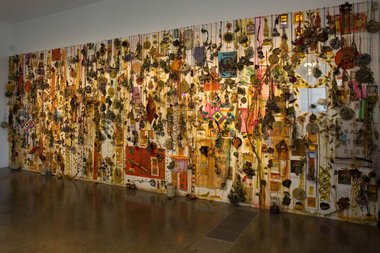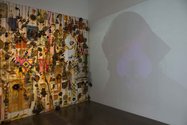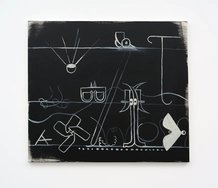John Hurrell – 27 January, 2015
Most artists would agree that art practice often has an exhilarating, euphoric component, but whether being engaged in artistic ‘sacred’ ritual and sending messages can provide effective healing for somebody who is in severe distress through the loss of a loved one is another matter. It might work as form of catharsis, but there is also the risk it might worsen and exacerbate the symptoms.
Titirangi
Tiffany Singh
Life is But a Vapour
11 December 2014 - 15 February 2015
In the summer of 2013/2014 Tiffany Singh had a three month residency in the McCahon House in Titirangi, and this Te Uru show is an installational modification (using interactive performance ‘residue’ on one wall) of the relational project, Calling a Circle, she carried out there.
With the shrinelike ambience of this exhibition, there are obvious connections to varieties of supplicatory fetishism found in Mexico, the Philippines and India, except because Singh’s project focuses on relief from grief, there are no wax or tin effigies of body parts ‘asking’ for medical assistance to cure physical ailments. Because Singh openly states her belief in certain Hindu and Buddhist practices, and Jungian notions of the Sacred, the word ‘fetishism’ is possibly offensive because of its associations with scientistic anthropology and, according to some, colonialism. Nevertheless she does refer in her gallery hand-out to the exhibit as a ‘living wall.’
She talks of the process as ‘offerings’. The focus here is on loss after the death of loved ones, and so the (what might be called ‘magical’) items come in the form of poems, prayers, messages, brass bells, small brightly coloured posters, folded paper boats, feathers, dried flowers, money, beads and wax images of Mary or Buddha and deities like Ganesh with his elephant head. The room smells of melted wax and incense, and there is a strong sense of ritualistic procedure. Fire (its traces) and water are conspicuous as symbols of mental cleansing.
In Singh’s quest to create a ‘sacred space where people were able to take some special time to contemplate the loss of a loved one’ she invited individuals ‘to come to the studio to share a quiet and sacred space and to make a string of bells, flowers and other trinkets with messages to loved ones who are no longer with them.’
This participation, via a socially oriented community art project, Singh sees as an effective form of healing. She references psychologist Mihaly Csikszentmihaly who says that ‘creativity is crucial in stimulating wellbeing,’ arguing that ‘flow, the creative moment when a person is completely immersed in an activity that is engaging and challenging for its own sake, is a natural anti-depressant.’
Most artists would agree that art practice often has an exhilarating, euphoric component, but whether being engaged in artistic ‘sacred’ ritual and sending messages can provide effective healing for somebody who is in severe distress through the loss of a loved one is another matter. It might work as form of catharsis, but there is also the risk it might worsen and exacerbate the symptoms. The idea of an artist claiming to instigate a healing process, with no professional specialist in sight, to me seems foolhardy, if not exploitative. Even though people are invited to participate - they are not compelled to – they might be emotionally susceptible and led on.
This show is meant as a process-based installation, constructed from the social activity in the studio (with selected materials transferred), yet it is very resolved and oddly painterly, packed with detail (as a worked-on wall surface) and strangely beautiful with all the dribbled wax. A film made by Robert George (with its multiple exposures and images of performance artist Lucy Mary Mulholland), projected on the spaces two short opposite walls, is very hard to discern - depending as it does on the lack of natural light coming in the adjacent windows.
The title emphasises the transience of life and is taken from the New Testament Epistle of James. (4:14). The odd thing is that this seems to contradict the ethos of Hinduism and Buddhism in that it emphasises merely the small picture of one single life only. The bigger picture of samsara, and the karmic process of reincarnation, is the repeated cycling of a single ‘transmigrating’ self in different bodies that continues for aeons. Not a wispy vapour at all, unless you take that phrase to include the entire chain of sequentially connected lives, continuing until that self’s final moment of release.
John Hurrell








 Advertising in this column
Advertising in this column Two Rooms presents a program of residencies and projects
Two Rooms presents a program of residencies and projects



This Discussion has 0 comments.
Comment
Participate
Register to Participate.
Sign in
Sign in to an existing account.